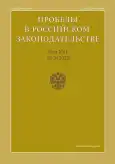Improving Methods of Countering Cybercrime in Modern Conditions
- Authors: Kodzov T.N.1
-
Affiliations:
- Krasnodar University of the Ministry of Internal Affairs of Russia
- Issue: Vol 16, No 5 (2023)
- Pages: 222-226
- Section: Criminal - legal, criminological, administrative and other measures for countering crime in contemporary conditions
- URL: https://journals.eco-vector.com/2072-3164/article/view/568830
- EDN: https://elibrary.ru/NOJGAL
- ID: 568830
Cite item
Abstract
The purpose of this study was to study the emergence of new subcultures in the global information space associated with cyberbullying and cyberbullying of Internet users.
Cyber violence is a criminal phenomenon that appeared with the development of the Internet. This type of crime was generated by such social tools as Instagram (owned by Meta Corporation, recognized as extremist in the Russian Federation), Twitter (also banned in the Russian Federation), as well as a number of social networks where you can post personal information, photos, etc. Criminals began to use digital technologies for intimidation, blackmail and extortion, and use other types of violence.
Statistics confirm that 7 out of 10 respondents have been subjected to violence on the Internet. Most often it was cyberbullying. Cyberbullying humiliates the dignity of the victim, ridicules her publicly, and other users often join such bullying in the online space. They leave comments, share intimidating content.
It has been established that the legislation is very fragmented, it does not work well on the topic of cyberspace, so many aspects of cyber violence escape the attention of researchers. The legislator proposes two regimes to combat cyber violence. The first includes those provisions that describe methods of countering and preventing undesirable actions. Such norms exist not only in criminal law, but also in administrative law and a number of other legal acts. It follows from this that Russian legislation can be supplemented with norms that will make it possible to deal more effectively with cyber violence. For example, regulatory legal acts should fix legal provisions that will reflect what cyber violence is and what measures to combat it can be proposed. This applies to the criminal, criminal procedure, administrative, civil, and economic sections of law. The legal system should completely close the issue of cyber violence. In addition, it is important to support the legislator with various social projects that would help prevent such crimes and minimize the consequences of them. In addition, centralization and systematization of all materials related to this topic is needed.
Keywords
Full Text
About the authors
Teymuraz N. Kodzov
Krasnodar University of the Ministry of Internal Affairs of Russia
Author for correspondence.
Email: mvd.kodzov@mail.ru
Cand.Sci.(Law), Police Senior Lieutenant, Lecturer of the Department of Fire Training, North Caucasus Institute for Advanced Studies (branch)
Russian Federation, Nalchik, KBRReferences
- Aslamova V.S. Internet crimes: types and preventive measures // In the collection: Law enforcement activities of internal affairs bodies in the context of modern scientific research. Materials of the All-Russian scientific and practical conference of adjuncts, postgraduates and applicants. Comp. E.R. Mirgorodskaya. St. Petersburg, 2022. pp. 162-164.
- Bolshakova A.R. Internet space as a factor in the manifestation of deviant behavior // In the collection: Topical issues of modern science and education. Collection of articles of the X International Scientific and Practical Conference: at 2 p.m. Penza, 2021. pp. 227-230.
- Vorobyeva K.I., Dolgachev M.V., Zaslavsky D.A. Psychological resources of human cybersecurity // Social and humanitarian sciences in the Far East. 2020. Vol. 17. No. 4. pp. 150-157.
- Zabolotskaya A.V., Tkacheva E.G. Psychological security of personality on the Internet // Autonomy of personality. 2022. No. 1 (27). pp. 91-97.
- Ivanova Yu.A., Sarbaev G.M. On the issue of cybercrime // In the book: Digital transformations of Economics and Law. Collection of scientific abstracts of the National Scientific and Practical Conference. Volgograd, 2022. pp. 58-64.
- Klimovskaya Yu.I. Cyberbullying, the danger of virtual bullying // In the collection: Improving the quality of education in modern conditions. proceedings of the V All-Russian Scientific and Practical Conference. North-Eastern Federal University named after M. K. Ammosov. 2020. pp. 112-115.
- Mazinskaya I.V. Cyberstalking as a new type of crime // In the collection: Cybercrime: risks and threats. Materials of the All-Russian student round scientific and practical table with international participation. St. Petersburg, 2021. pp. 91-95.
- Mosechkin I.N. Remote mental violence: prospects for improving criminal legislation // Psychology and Law. 2021. Vol. 11. No. 4. pp. 64-76.
- Petrova A.V., Shatunov Yu.A. Cybercrime: origins and motivation factors // In the collection: The State policy of the Russian Federation in the field of combating terrorism, corruption and drug addiction of society. Collection of scientific papers of the XVII All-Russian Scientific and Practical Conference. Cheboksary, 2022. pp. 496-502.
- Shevtsova V.A. Features of detection and suppression of illegal actions on the Internet among minors // Eurasian Legal Journal. 2022. No. 9 (172). pp. 427-428.
Supplementary files








